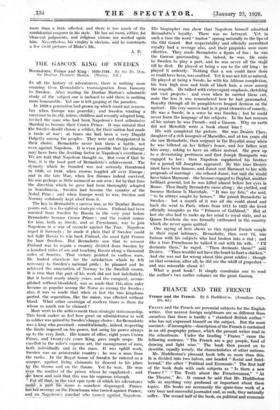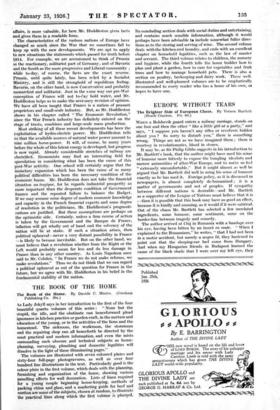FRANCE 'AND THE FRENCH
FRANCE and the French are perennial subjects for the English writer. Our nearest foreign neighbours are so different from ourselves that there is hardly a " standard British author " who has not expressed himself on the subject. But the most succinct—if incomplete—description of the French is contained in an old geography primer, which the present writer read in the schoolroom. Under the heading " France " came the following sentence, " The French are a gay people, fond of dancing and light wine." The book then passed on to describe, equally tersely, the characteristics of other nations.
Mr. Huddleston's pleasant book tells us more than this. It is divided into two halves, one headed " Social and Intel- lectual," the other " Political and Economic." The first half of the book deals with such subjects as " Is there a new France ? " " The Truth about the Frenchwoman," " At the Theatre," &c. It cannot be said that Mr. Huddleston tells us anything very profound or important about these topics. His books are necessarily the spare-time work of a very busy and successful journalist and, as such, they naturally suffer. The second half of the book, on political and economic affairs, is more valuable, for here Mr. Huddleston gives facts
and,gives.. them in a readable form. - • The characteristics of the various nations of Europe have changed so much since the War that we sometimes fail to keep up with the, new developments. We are: apt to apply tc_new situations the statements which passed for truth before 1914. For example, we are accustomed to think-of Prussia. as the reactionary, militarist part of Germany, and-of Bavaria: and the South as the more progressive and Liberal community ; While to-day; of course, the facts are the exact reverse. Prussia, until quite lately, has . been ruled by a Socialist Ministry, and is still the stronghold of republican feeling. Bavaria, on the other hand, is now Comer vative and probably Monarchist and militarist. Just in the ssme way our pre-War conception of France will not to-day hold water, and Mr. Huddleston helps us to make the necessary revision of ofoinion. We have all been taught that France is a nation of peasant proprietors and small-scale industry. But, as Mr. Huddleston Shows in his chapter called " The Economic Revolution," Since the War French industry has definitely entered on the stage, of trusts, combines and large-scale mass production. Most striking of all these recent developnienta has been the exploitation of hydro-electric power. Mr. Huddleston tells us that the available sources of natural' water power amount to nine million horse-power. It will, of course, be many -yearS before the whole of this latent energy is developed, but progress is now rapid. Already considerable stretches of railway are electrified. Economists may find 'an interesting field for speculation in considering what has been the cause of this post-War activity. One school will certainly argue that the monetary expansion which has been the cause of so many political difficulties has been the necessary condition of the eConomic boom. Mr; Huddleston does not take the financial Situation au rragique, for he regards industrial prosperity as More impOrtant than the desperate condition of Government finance and the repeated failure to balance the Budget. If we may assume some degree of modern economic knowledge and capacity in the French financial experts and some degree Of resolution in the politicians; Mr. Huddleston'S prognosti- cations are justified. But these assumptions are perhaps on the optimistic side. Certainly, unless a firm course of action is taken by the Government and the Banque de France, inflation will get wholly out of hand and the solvency of the nation. Will be at stake. If such a situation arises, then political upheaval—never a very distant possibility in France likely to become inevitable. But on the other hand, we must believe that a revolution whether from the Right or the Left would probably mean far less and do less damage in Prance than in any other country. As Louis Napoleon once said to Mr.- Cobden, " In France we do not make reforms, we make revolutions." Thus we do not think that we can regard a political Upheaval as out of the question for France in the future, but we agree with Mr. Huddleston in his belief in the fundamental stability of the nation.











































 Previous page
Previous page